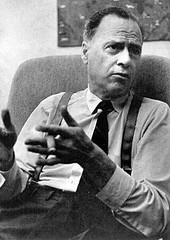 Marshall McLuhan (right), before he became a prophet of new media was a superb critic of English literature. You read his essays on writers, so beautiful, so erudite, so solidly reasoned, so traditional in form and you can have no idea of what his career held for him.
Marshall McLuhan (right), before he became a prophet of new media was a superb critic of English literature. You read his essays on writers, so beautiful, so erudite, so solidly reasoned, so traditional in form and you can have no idea of what his career held for him.Reading McL's old English Lit stuff one marvels. And yet, these polished, scholarly works are nothing that anyone needs anymore - he is not cited in that field and his best work is long forgotten. His tentative media "probes" on the other hand continue to point the way towards a new sociology of communication. The transition for McLuhan - this is important - was fast, almost immediate.
Here's the counterintuitive part: his impact was through ephemeral media (e.g. TV appearances, symposia, lectures) that we can no longer access. Yes, we have a few books, but these were launching pads from which huge amounts of ethereal interactions followed. McL abandoned the safe and sane work of books, publishing, teaching, for argument in the moment. If his career is a study in the transmission of ideas, we have something important to learn in Civil War circles. Particularly within this Internet.
After several false transformations (trying to cross over into television and films) our Civil War culture has reached a switchpoint. But where McLuhan could suddenly see culture being conveyed and transformed in all sorts of media, we continue to rivet our attention to the book as conveyance of choice. Edward Ayers tried to nudge us forward into his Valley of the Shadow but we were not prepared to walk with him - and that project ultimately became (sigh) another book.
Let me rephrase that. A terribly important and famous ACW Web project became a boring and predictable print media artifact. On some level, someone told Ayers his project was a failure if it simply stayed on the Web.
My friends, we can fail much better than to release another book to small sales into a confused and ignorant marketplace. If we apply ourselves, we can fail most excellently indeed.
And what is this world of nonfiction trade publishing anyway? It is a world in which sales levels cow scholars, where the size of a public following conveys a "truth" that floats free of sources, free of argument, free of new discoveries. It is a self-limiting scandal, a harlot to entertain us by the fireplace or on the beach. A harlot that demands, oddly, to be taken seriously.
Drinks with Tim
Tim Reese and I were having a beer in Ball's Bluff Tavern, Leesburg, a few weeks ago when the talk turned, naturally enough, to failure.
Tim has one foot in the Web and another in books. Tim was nudging me towards publishing "that book" and I was nudging back: "Put everything you have on the Internet," I said. "You are the expert on Crampton's Gap and the Lost Order - everyone will find your stuff who searches the Web. Your material trumps every written work to date. You are empowering the student to know more than the professor. You are empowering the reviewer to correct the next hack's Maryland Campaign history. You can have a lasting effect without losing money or suffering in the expectations game."
Well it went something like that. But then I saw Moe last week and he said Tim told him to tell me to get that book going, so maybe my arguments were not as clear as remembered.
My dinner with Moe (and Wanda)
Moe Daoust and I were co-founders of the McClellan Society online; he and his wonderful spouse Wanda were in Leesburg last week - down from their home in Western Canada. Over some nice wine and 18th Century American cooking - the specialty of the house at the Green Tree restaurant - Moe urged me to get "that book going."
Later this year, Moe is going to have an article published in a Civil War glossy that represents years of research. It will play havoc with our understanding of events at Burnside's Bridge. He seemed kindly disposed towards the world of print.
I tried my Intenet arguments out on him. "You know too much about McClellan," was his rejoinder, if I recall. Books don't have an impact, books don't make money, I think I said. Moe and Wanda said it was more about getting it down, out of the head onto paper.
"I'm going to stay on you until we have that book," he promised, his very words on parting.
Towards a manifesto
I may write a book. I'm thinking about it. But I don't feel obliged to do so.
Can this blog be a book substitute? I think it can. It requires a leap of faith, perhaps, over the bound book culture. It requires a dispensation: "He's not being lazy or unfocused."
Can pathbreaking research be published on the web? I think it must be. The least we can have from copyrighted work is summary and conclusions.
Given the painful transition out of print technology, the decline in the Civil War publishing model, and the accessibility of web publishing to everyman, it seems to me we can all fail better, much better, on the Internet.
Can that be my credo?
(Hat tip to Tim, Moe, Wanda, Eric, Marshall, and Malcom McLaren)



